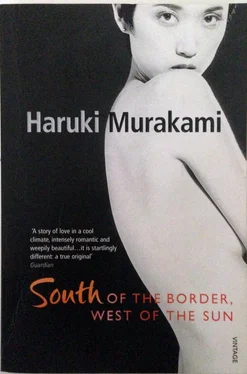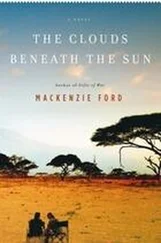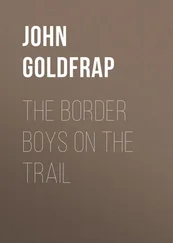As I held her, I remembered the attempted suicide her father had told me about. I was sure she wouldn’t make it . She’s a goner, I figured . If things had taken even the slightest of wrong turns, I wouldn’t be holding her body like this. Gently I touched her shoulder, her hair and breasts. They were real—warm and soft. Beneath my palm I could feel her life. No one could say how long that life would last. Whatever has form can disappear in an instant. Yukiko. This room. These walls, this ceiling, this window. They might all be gone before we knew it. Suddenly Izumi came to mind. That man had hurt Yukiko deeply, and I had done the same to Izumi. Yukiko happened to meet me after that, but Izumi was all alone.
I kissed Yukiko’s soft neck.
“I’m going to sleep for a while,” I said. “And then I’ll go to the nursery school to pick her up.”
“Sleep well,” she told me.
I slept for just a short time. When I opened my eyes, it was past three p.m. From the bedroom window I could see the Aoyama Cemetery. I sat down in a chair by the window and stared at it for a long time. So many things looked different now, now that Shimamoto had shown up in my life again. I could hear Yukiko preparing dinner in the kitchen. The sounds rang hollowly in my ears, like those transmitted down a pipe from a world terribly far away.
I got the BMW out of the underground garage and headed for the nursery school to pick up my daughter. They had some special program at the school that day, so it was almost four when she appeared at the school gate. You could always count on a line of shiny, expensive cars there—Saabs, Jaguars, even the occasional Alfa Romeo. Young mothers in expensive-looking coats got out of the cars, collected their children, deposited them in the cars, and took off. My daughter was the only child whose father came to pick her up. When I saw her, I called out her name and waved. She waved her tiny hand and came toward me. Then she saw a little girl sitting in a blue Mercedes 260E and ran over to her, yelling out something. The girl had on a red woolen cap and was leaning out the window of the parked car. The girl’s mother wore a red cashmere coat and a large pair of sunglasses. When I went over there and took my daughter’s hand, the woman turned to me and smiled broadly. I returned the smile. The red coat and the sunglasses made me think of Shimamoto. The Shimamoto I followed from Shibuya to Aoyama.
“Hi,” I said.
“Hi,” she said.
The woman was stunning. She couldn’t have been much more than twenty-five. Her car stereo was playing the Talking Heads’ “Burning Down the House.” In the back seat were two paper shopping bags from Kinokuniya. She had a beautiful smile. My daughter whispered for a while to her little friend, then said goodbye. Bye, said the girl. Then she pushed the button and closed the window of the car. I took my daughter’s hand and walked her over to where the BMW was parked.
“How was your day? Anything fun happen?” I asked.
She shook her head emphatically. “Nothing fun at all. It was terrible,” she said.
“Tough time for both of us,” I said. I leaned over and kissed her forehead, and she made the same sour face owners of snobby French restaurants produce when you hand them your American Express card. “I’m sure tomorrow will be much better,” I told her.
I wanted to believe that too. When I opened my eyes tomorrow, the world would be new, and every problem would be solved. But I couldn’t swallow that scenario. For I had a wife and two daughters. And I was in love with someone else.
“Daddy?” my daughter said. “I wanna ride a horse. Buy me a horse someday?”
“Sure. Someday,” I said.
“When’s someday?”
“When Daddy’s saved up some money. Then he’ll buy you a horse.”
“Do you have a piggy bank, Daddy?”
“Yes, a very big one. As big as this car. If I don’t save up that much money, I won’t be able to buy you a horse.”
“If we ask Grandpa, do you think he’ll buy me a horse? Grandpa’s rich.”
“That’s right,” I said. “Grandpa has a piggy bank as big as that building over there. With lots of money inside. But it’s so big it’s hard to get the money out.”
My daughter thought about it for a while.
“But can I ask Grandpa sometime? To buy me a horse?”
“Sure, you can ask him. Who knows, he might even buy one for you.”
We talked about horses all the way home. What color horse she liked. What name she’d give it. Where she would like to ride to. Where the horse would sleep. I put her on the apartment elevator and headed for work. What would tomorrow bring? I wondered. Both hands on the wheel, I closed my eyes. I didn’t feel like I was in my own body; my body was just a lonely, temporary container I happened to be borrowing. What would become of me tomorrow I did not know. Buying my daughter a horse—the idea took on an unexpected urgency. I had to buy it for her before things disappeared. Before the world fell to pieces.
From then until the spring, Shimamoto and I saw each other almost every week. She would stop by one of the bars, more often than not the Robin’s Nest, always past nine. She’d sit at the bar, have a couple of cocktails, and leave around eleven. I’d sit beside her, and we’d talk. I don’t know what my employees thought of this, but I didn’t care. It was like when we were in grade school and I didn’t let what my classmates thought about the two of us concern me.
Occasionally she’d call and invite me to have lunch. Most often we’d arrange to meet at a coffee shop on Omote Sando. We’d have a light meal and take a walk. We’d be together two, at most three, hours. When it was time for her to leave, she’d glance at her watch and then smile at me. “Guess I’d better be going,” she’d say. Her usual wonderful smile. I couldn’t read any of her emotions behind that smile. Whether she felt sad at leaving, or not so sad, or maybe relieved to be rid of me, I had no idea. I couldn’t even tell if she really did have to get home.
Anyhow, during the couple of hours we were together, we hardly stopped talking. Not once, though, did our bodies come in contact. Not once did I put my arm around her shoulder or even so much as hold her hand.
Back on the streets of Tokyo, Shimamoto had her usual cool, attractive smile. No more the rush of violent emotions she displayed on that cold February day in Ishikawa. The warm closeness born on that day was gone. As if by unspoken agreement, we never once mentioned our strange little trip.
As we walked side by side, I wondered what feelings she held in her heart. And where those feelings would lead her. Sometimes I looked deep into her eyes, but all I could detect was a gentle silence. As before, the line of her eyelids brought to mind the horizon, far off in the distance. At long last I could understand Izumi’s loneliness when we were going out Shimamoto had her own little world within her. A world that was for her alone, one I could not enter. Once, the door to that world had begun to open a crack. But now it was closed.
I felt again like a helpless, confused twelve-year-old. I had no idea what I should do, what I should say. I tried my best to stay calm and use my head. But it was hopeless. Everything I said and did was wrong. Every emotion was swallowed up in that radiant smile. Don’t worry , her smile told me. It’s all right .
I was completely in the dark regarding Shimamoto’s life. I didn’t even know where she lived. Or who she lived with. Whether she was married, or had been. The only thing I knew was that last February she had had a baby, which died the next day. And that she’d never worked. Still, she always wore the most expensive-looking clothes and accessories, which meant that she had a fair amount of money. That’s all I knew about her. She was probably married when she had the baby, but I couldn’t be sure. Thousands of babies are born out of wedlock every day, right?
Читать дальше












